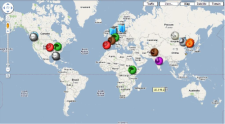Dropped Packets
Emily Mangan
First of all, I’m very, very sorry for not updating DayBreak Magazine for two months: this story should have gone live on June 25. There were some very urgent developments in my private life and at the day job that needed to be sorted and had top priority. As things seem to have calmed down, I’m trying to catch up on DayBreak and the Shine anthology sites. My sincere apologies to the readers and writers involved.
In the upcoming weeks, I’ll try to catch up by publishing a story every Friday (instead of every second Friday).
So first after the hiatus is “Dropped Packets”: here’s a lyrical and bittersweet look at an India that isn’t, but might yet come to be. In contrast to most of the other DayBreak stories, this one is more about the dream rather than the actuality, the vision preceding the change, the pointer to the way up. And it’s never too late to go up, especially as the messages keep raining down . . .
Suniti grabbed the back of Harisha’s shirt and yanked him down to the grey dust-covered concrete. Harisha launched himself again at the worn cable, but she pulled him back.
Harisha tugged at Suniti’s hand. “Dammit, I wish you went to work today. You’re gonna—”
“You are not leaving!” Suniti continued to hold him to the ground, the filtered light from the layers and layers and layers of cable and wire spanning across the warehouses dancing across them.
“I’m going up there. I am. The Age—”
“The Age doesn’t exist.”
“Bye, Suniti.”
Harisha pushed himself off the concrete, his thin shirt stretched out from Suniti’s grasping fingers. He left her there, Suniti, sitting in the thick gray dusk on the cold concrete ground. She wanted to jump after him, to say just the right words to make him change his mind, come back to her, but he was kicking his shoes off, climbing up the cables, up and up, casting hardly a shadow as he disappeared. He dropped the little red note that had fluttered down to him the day before, and it fluttered now, like a sickly bird, alighting on the cables and coming to rest at Suniti’s feet, half covered by the thick stone dust.
Harisha would be back. He’d tried to go up through the Layers before, when they were kids. Yet Suniti was breathing hard and the scuffles of her shoes on the concrete when she stood were unbearably loud in the dim, quiet street. It didn’t echo, as there wasn’t a flat surface untouched by cables large enough to perpetuate the sound. The adrenaline made her blood feel hard in her veins as it coursed through them and slowly she picked up the shoes her brother had kicked off, picked up the note. She couldn’t bring herself to read its madness. The Age did not exist.
The sun was far past noon and filtered down through the everlasting canopy of sagging ropes and cables and wires in small triangles of light that moved and swayed with the vibrations of feet and birds. India had advanced so quickly, growing rapidly in every way, the warehouses grew taller, being built upon each other, leaving little space where they met down below, on the concrete covered ground. But they weren’t being built on anymore. Nothing was stored in them. Technology was piped across the gaps in between, information condensed into binary and further into liquid impulses sent through tubes, networking the warehouses with cold cables that were slowly walling off the sun from the layered alleys below. Suniti saw small children far down the alley chasing after the brightest patches of sun that filtered through, just fleeting dim glows, pushing each other out of the way, opening their mouths underneath like slow red flowers waiting for rain. They didn’t know what was happening in the world, the changes, didn’t know that their hopes and dreams were slowly losing their luster. The food, stored in heavy metal containers in the warehouses, was growing sparse and it left little to hope for.
Suniti looked up, tracing the way Harisha had climbed. He’d been out of sight for minutes but once he found nothing up above in the monotony of cables, she was sure he’d come back. Harisha had never listened to reason and she hated him for it. She leaned her head back against the dusty concrete wall, her shoulders pressed between cold rusty pipes, to which several black cables had been welded, their bright copper showing frayed where the smart casing had been rubbed away.
The air was quite still down here. The people used to be stagnant, gray, but now they were forgotten. Children were still gaggling in the streets, mostly unaware of their situation. As they aged, Suniti knew she would see the gray fill their eyes, the dullness in their skin and their hair. The children, spending most of their time looking up, would learn to look down, learn to dismiss the idea of a sun and bright clothes. They would troll the warehouses, finding toys and food and weapons to sell. India was far behind of the rest of the world, parts forgotten by the government, people forgotten by each other.
But the Age took more every day. The ones who climbed up always left their doors open, their small houses, built into the side of the warehouses, full of their little belongings. Suniti couldn’t bring herself to believe in the Age, a magical place in the rooftops and the sun, wouldn’t let herself. She couldn’t let herself be disappointed, not again. Toying with the idea of hope made it difficult to eat cans of beans salvaged from the warehouses night after night, to see the streets empty slowly, until she was left alone. She didn’t want to be alone.
She opened the little three-inch red note in her hand. The inside was blank, save for very small writing in the bottom right corner: “The Age: Save India.”
Suniti flipped the note away.
“Dammit, Harisha.” She let her breath out, turned around and craned her neck back.
Still no sign of him.
Suniti was much too old for games, for breaking rules, but Harisha’s absence tugged at her, made her fingers and toes restless.
The gaggle of children ran by in a group, pulling the shoes from Suniti’s hands. She managed to keep one from them as it flung to the ground, but the other was eaten up by the mess of tiny fingers scouring the alley for trouble. She picked up and threw the remaining shoe after them and it landed in a puff of gray dust, quiet, insignificant.
She glanced after the way the children had run, feeling very alone, abandoned. The alley was empty, quiet, and she wondered with an ebbing fear if she was the last one here, on the bottom.
Slowly, the grey of the alley hiding her sound and stealing her presence from the stillness, Suniti slipped off her shoes.
She was going to kick Harisha’s ass, once she found him.
The copper was tingly under her bare feet and she stood close to the wall, all the adrenalin-filled muscles in her body straining to pull her up, to keep her up, to push her up. Climbing was much harder than she had expected. The muscles in her legs stretched further than they ever had, her tendons complaining of the strain. Her shoulders were thin and good for slipping between the smallest alleyways, but it seemed they didn’t have the strength inside of them to pull herself up. She was always stepping on her skirts and the matrix of wires and cables swayed and bounced and elastic under her weight.
There were no sounds when she reached the first Layer, and Harisha still hadn’t come down.
Their conversations played back in her head, as if she would never see him again.
She ran her hands along the exposed copper of the cables, trying to see the way Harisha had jumped up so nimbly in her head. She pushed herself up, stepping on her skirt again, nearly pulling herself off the cables with the jerk. Her near fall made her cling for half-seconds before placing another foot. Many nights she had seen red notes fall, landing like quiet little sun petals in the dust. They had all been written with non sequiturs, Sanskrit quotes, and the names to who they were offered. She could feel the crinkly thing in her pocket, hear it every time she bent her leg.
On the second layer, Suniti saw one old woman, dressed in faded green. She was sweeping dust from the cables outside her door, outletted into the stone and metal of the warehouse, her home snug between the inner and outer walls. She didn’t acknowledge Suniti, just watched the grey dust and bits of stone tumbling down through the cables to hit the concrete far below.
Suniti placed another hand on a cable, her whole body shaking. Harisha wasn’t anywhere in sight and she was higher than she’d ever been before, even as a child. She found herself weak, and doubted she could even stand. She couldn’t see the ground anymore, and nothing would keep her from falling through the web of cables, breaking on the concrete far below. She felt so exposed, small, and even the sun became more intense as she climbed, glinting into her eyes, heating the black smart casing around the wires so that they burned her hands.
Suniti’s eyes teared and her muscles locked up when she reached the third Layer. She didn’t think Harisha could have gone this far, but somehow she knew he had climbed farther. He wouldn’t have stopped. The realization that he really was trying to find the Age sent panic though her. The third Layer had few inhabitants, about twenty that she could see reach, and they were old, their faces lined with dust and worry. A man was peeking at Suniti through his tiny square window and when she glanced at him, he shut it tightly.
Little doors and windows and outlets were pushed into the warehouses on either side of the Layer, and thin pigeons fluttered everywhere. Looking down the warehouses in the half-light, down the alley they formed, Suniti couldn’t see the end of them. The Layers seemed to go on forever, and looking down there, trying to find an end, the vertigo caught up with her. There were no straight lines, nothing even. The elder people balanced, their toes and their heels separate heights and it played with Suniti’s sense of gravity.
Harisha was nowhere she could see, up, sideways, or down. Suniti didn’t know what she was doing up here, she was afraid to climb down, and afraid to climb on. The smart casing was hurting her hands, and the cables she sat on swayed in the stiffening breeze, made her nauseous. She closed her eyes and breathed carefully, trying not to vomit.
A little boy dressed in a bright yellow coverall with red ribbons pinned all over it bounced the net of cables. Suniti opened her eyes at the movement, looked up into his face. He was curious, his dark eyes quick, one of his front teeth missing from his twitching smile. His hair was shiny.
“Up,” he said, and climbed away.
Suniti squeezed her cable-chair tighter, looked up into the splotchy and now flickering sunlight. Red notes were fluttering down through the Layers in swarms, caught up and about by the breeze in all directions along the warehouses. The red filled the sky and the pigeons flew from them. The notes caught on the wires, in clothes, in the people’s hair and hands. The breeze scattered the red snow and she caught a note in her fingers, like a red butterfly as it fluttered past, and inside read only one thing: Up.
There were hundreds of the little invitations, raining down all throughout the warehouses and the alleys and there was hardly anyone left to receive them.
Suniti climbed. She pulled herself up with the weak shoulders of hers and the adrenaline subsided and metabolized, her fingers could close around the smart casings again. There was a rhythm to it now, climbing. It hurt her wrists, her fingers white from clutching her body’s weight away from gravity, her hair blowing into her face and stinging her eyes. Everyone had gone somewhere, the little red notes coming and taking them away. She couldn’t hide it anymore, couldn’t deny her wild fantasy of a world-wide roof-top civilization, recycling metal from the warehouses and bring dirt up from the soil to plant anew in the sun. It was either there, or it wasn’t, but she had to know. She’d find Harisha there, she knew, if it existed or not.
The surface was much closer than Suniti had thought, but it seemed like each inch was pure pain. Her muscles were lose and seemed to be gelatinous inside her skin as she pulled herself over the edge of the warehouse roof, her feet sinking right into . . . dirt. Soft black dirt. She kneeled as the sun beat down on her, blinding her.
The costumes she saw were outrageous, the colors vibrant and new. The people painted their faces and their hands and their feet in orange and red and yellow, bold patterns and designs, the paint rubbing off on whatever they touched, leaving a sweet glow in their wake. There were little children, at home on the roof, dirt between their toes as they moved, their dark hair shining in the sun. Suniti felt gray and out of place, but it was so beautiful, so true.
All around her, on the rooftops, people planted in the soil, they trotted back and forth, touting metal scraps, building communication towers on top of the warehouse roofs, out of the warehouse roofs. A small troop of little children stood at the edge of the warehouses, sprinkling off little reds notes to flutter in the wind.
The smell of sweat and excitement was all around her. She could see for miles and miles, each warehouse different, little structures built from scrap metal, green houses, towers, beds of fresh growing things. She was kneeling on top of her world. Harisha had believed in the Age, believed it existed, believed that people were out there who would give their lives to the sun and to India and to the planet. Suniti did now, too. The gap-toothed boy was sitting on the edge of the roof, his feet digging little holes in the soil. He smiled at her and held up a note in the air. Suniti pulled the crinkling paper from her pocket with her tired fingers and they raised their red notes, reaching for the sky, for a new India.
“Dropped Packets” by Emily Mangan. Copyright © 2010 by Emily Mangan.
Picture Credits:
- Oskar Red: via Exit Interiors;
- Enmeshed Wire: via Upwoods;
- An Empty Alley: via Nik Daum;
- Rooftop Garden Signs: via Kostadin Krajcev;
- Rooftop Garden: via China Economic Net;
- Painted Face: via Picsdigger;
 Emily Mangan decided several things between the ages of three, five, and seven. First, she decided that she enjoyed writing and penciled a storybook about her brother having a migraine. Second, she decided that she was going to be a veterinarian. And third, while in the bathtub, she hypothesized that if there really were other universes, and if they really ever were to collide someday due to a rogue time machine or similar mishap, the probability that she would come to not exist would be very slim.
Emily Mangan decided several things between the ages of three, five, and seven. First, she decided that she enjoyed writing and penciled a storybook about her brother having a migraine. Second, she decided that she was going to be a veterinarian. And third, while in the bathtub, she hypothesized that if there really were other universes, and if they really ever were to collide someday due to a rogue time machine or similar mishap, the probability that she would come to not exist would be very slim.
Emily won many writing contests as a child, published her work in Upstarts and Skipping Stones Magazine, and now serves on the board of the Young Writers Association, which provides written arts for children in the community. She attends Lane Community College in Eugene, Oregon, where she also tutors writing and grammar. After she completes her B.S. in zoology, she will tackle the task of becoming a large-animal veterinarian. She enjoys horseback riding, archery, carving rubber stamps, and physics.
An interactive map with story locations:
























